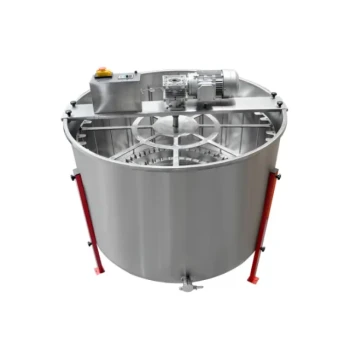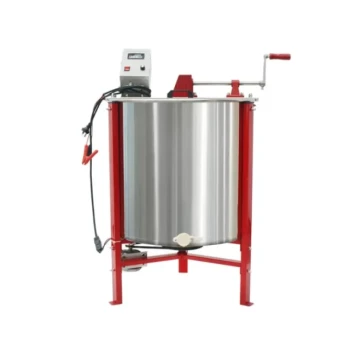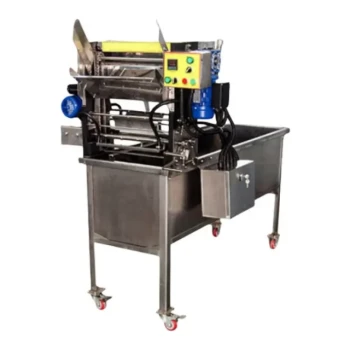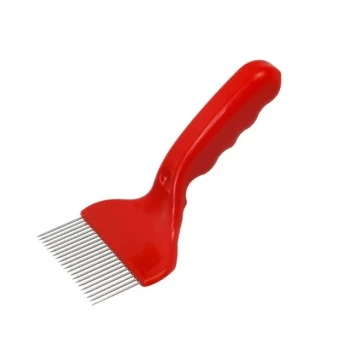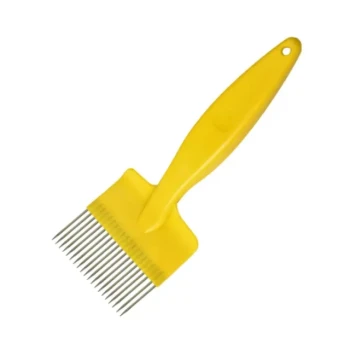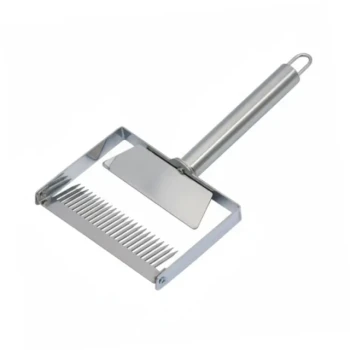For a successful harvest, the process of extracting honey with a centrifuge involves five key stages. First, you must remove frames of fully capped honey from the hive. Next, you use a heated knife or uncapping fork to slice off the thin layer of wax sealing the honeycomb cells. The uncapped frames are then placed inside the extractor, which spins and uses centrifugal force to sling the honey out against the drum walls, where it drips down for collection. Finally, the empty combs are returned to the hive for the bees to refill.
Centrifugal extraction is the industry standard for one critical reason: it allows you to harvest honey without destroying the delicate wax comb. This preserves the bees' significant energy investment, allowing them to focus on honey production rather than rebuilding.
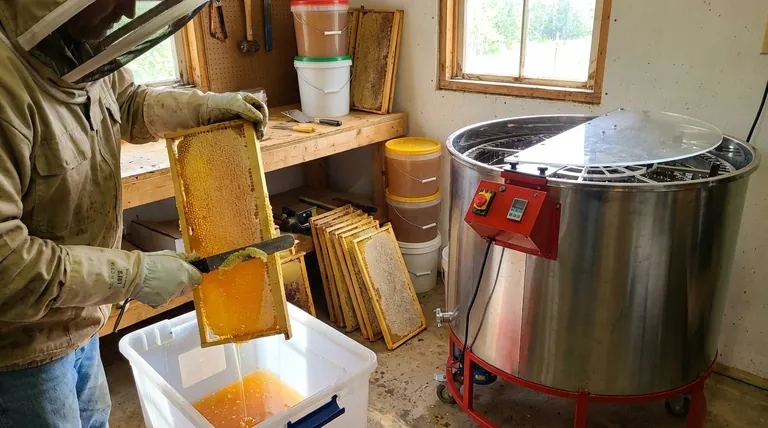
The Principle of Centrifugal Extraction
Understanding how an extractor works reveals why it is such an effective tool for beekeepers. The process is based on simple physics and a deep respect for the bees' labor.
How Centrifugal Force Works
An extractor is essentially a large drum with a mechanism to spin frames. When the frames are spun, the honey, being liquid and dense, is flung outward from the comb's cells and hits the inner wall of the drum. Gravity then pulls the collected honey down to a spigot at the bottom.
Why Preserving the Comb is Crucial
Bees expend an enormous amount of energy to produce wax and construct a perfect honeycomb. By extracting honey without destroying this structure, you give them a massive head start. Returning empty "wet" combs encourages them to clean and refill them immediately, leading to a more productive and less stressed colony.
Step-by-Step Extraction Process
Each step in the extraction process is designed for efficiency and to minimize stress on both the bees and the equipment.
Step 1: Select and Remove Frames
Only harvest frames where the honey cells are fully "capped" with a layer of white beeswax. This cap is the bees' signal that the honey has been dehydrated to the correct moisture content (under 18.6%) and is ready for long-term storage. Extracting "unripe" or uncapped honey can lead to fermentation and spoilage.
Step 2: Uncap the Honeycomb
Using a specialized heated knife, an uncapping fork, or a roller, carefully remove the wax cappings from both sides of the frame. This opens the cells and allows the honey to be extracted. Work over a container to collect the wax cappings, as they contain a good amount of honey that can be strained out later.
Step 3: Load the Extractor
Place the uncapped frames into the slots within the extractor basket. It is critical to balance the load. Place frames of similar weight directly opposite each other, just as you would when loading a washing machine. An unbalanced load will cause violent shaking that can damage the extractor and the frames.
Step 4: Spin and Collect
Begin spinning the extractor slowly. A gradual start prevents the sheer weight of the honey from blowing out the comb structure. As honey is extracted from the first side, you can gradually increase the speed. If using a tangential extractor, you will need to flip the frames and spin the other side. Radial extractors extract from both sides at once.
Step 5: Return the Frames
Once the frames are empty and significantly lighter, they can be returned to the hive. Many beekeepers place them back in the hive for a day or two for the bees to clean up any remaining honey before storing them for the next season.
Understanding the Trade-offs and Pitfalls
While efficient, centrifugal extraction requires care to avoid common mistakes that can damage your harvest, your combs, or your equipment.
Risk: Damaging Fragile Combs
The most common error is spinning the extractor too fast, too soon. The weight of the honey can tear the wax foundation, especially on warm days when the wax is softer. Always start slow and ramp up the speed gradually as the frames become lighter.
Risk: An Unbalanced Extractor
Never run an extractor with an unbalanced load. The resulting vibration can damage the bearings and potentially "walk" the entire machine across the floor. If it starts to shake violently, stop immediately and rearrange the frames for better balance.
Alternative: The Crush and Strain Method
For hobbyists with only one or two hives, the investment in an extractor may not be justified. The "crush and strain" method involves mashing up the entire comb and letting the honey drip through a series of filters. This destroys the comb, but it is simple and requires no specialized equipment. It is also the standard method for processing the honey-rich wax cappings from a centrifugal extraction.
Making the Right Choice for Your Goal
Your approach to extraction depends on your scale and long-term beekeeping philosophy.
- If your primary focus is colony health and long-term honey production: Centrifugal extraction is the superior choice because it preserves the bees' comb and energy.
- If you are a small-scale hobbyist with very few hives or processing cappings: The crush and strain method is a perfectly viable and low-cost alternative.
- If you value honey with the highest possible pollen content: The crush and strain method may result in honey with more retained pollen, as filtering is often less fine than in large commercial operations.
Ultimately, a successful harvest is one that provides you with delicious honey while leaving your colony strong and ready for the season ahead.
Summary Table:
| Step | Key Action | Critical Tip |
|---|---|---|
| 1. Select Frames | Harvest only fully capped honey frames. | Ensures honey is ripe (moisture <18.6%) to prevent spoilage. |
| 2. Uncap Comb | Slice off wax cappings with a heated knife or fork. | Work over a container to collect honey-rich cappings. |
| 3. Load Extractor | Place uncapped frames in the extractor basket. | Balance the load by placing frames of similar weight opposite each other. |
| 4. Spin & Collect | Start spinning slowly, then gradually increase speed. | A slow start prevents comb damage from the honey's weight. |
| 5. Return Frames | Place empty frames back in the hive for bees to clean. | Promotes colony health and readiness for the next season. |
Ready to maximize your harvest efficiency and support your colony's health?
HONESTBEE supplies commercial apiaries and beekeeping equipment distributors with high-quality, durable honey extractors and essential beekeeping supplies through our wholesale-focused operations. Our equipment is designed for the rigors of commercial use, helping you achieve faster, more reliable harvests while preserving the vital wax comb your bees work so hard to build.
Contact HONESTBEE today to discuss your wholesale needs and learn how our solutions can enhance your operation's productivity and profitability.
Visual Guide
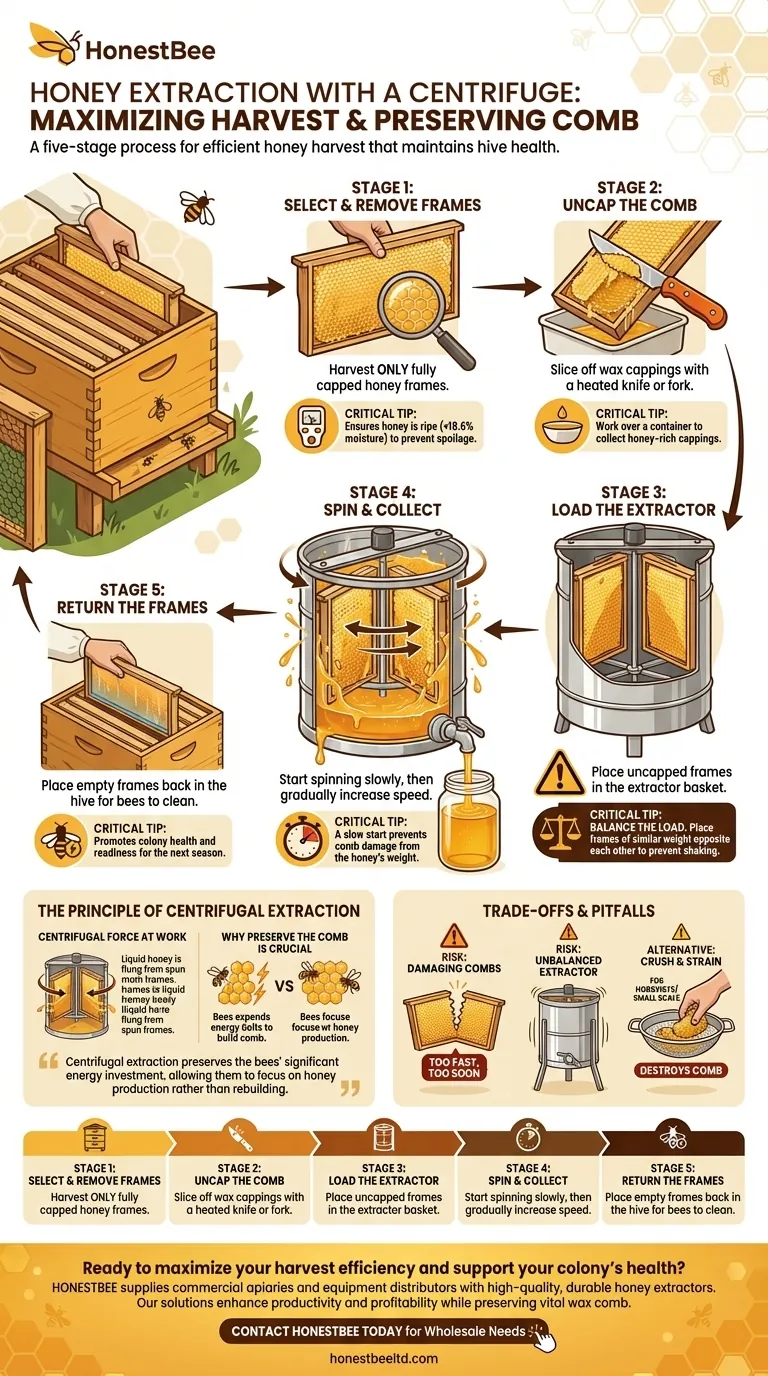
Related Products
- HONESTBEE 72 Frame Industrial Electric Honey Extractor for Beekeeping
- electric honey extractor honey centrifuge 3 frame honey extractor stainless steel honey frame extractor
- 40 Frame Commercial Electric Honey Extractor for Beekeeping
- 6 Frame Manual Stainless Steel Honey Extractor Beekeeping Equipment
- 8-Frame Electric Self-Reversing Honey Extractor Spinner for Commercial Honey Extraction Equipment
People Also Ask
- Which type of honey extractor, electric or manual, is faster? Maximize Your Apiary Efficiency and Speed
- How do beekeepers separate honey from wax? Master Efficient Centrifugal Extraction Techniques
- What is the purpose of a honey extractor? Efficiently Harvest Honey & Preserve Comb
- How to get honey out of a frame without an extractor? Two Simple Methods for Small-Scale Beekeepers
- Why is advanced honey extraction and processing equipment essential? Boost Efficiency & Output
- Why are 100-120 frame radial honey extractors utilized in commercial honey production? Maximize Yield & Efficiency
- What are the benefits of using a motorized extractor? Boost Efficiency & Protect Your Honeycomb
- What are the potential drawbacks of using a honey extractor? Key Risks and Investment Realities


